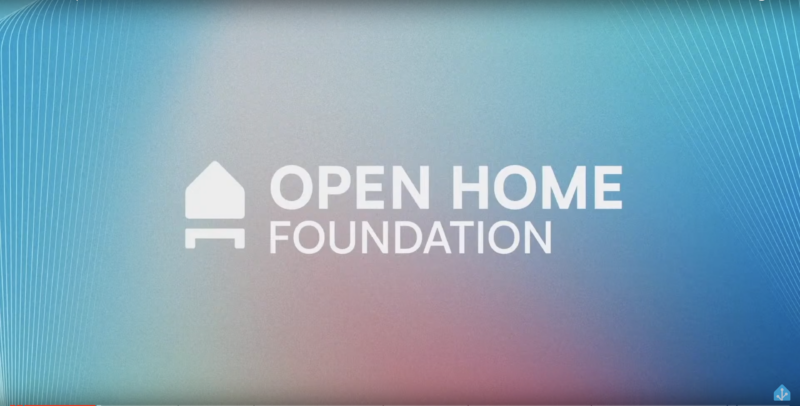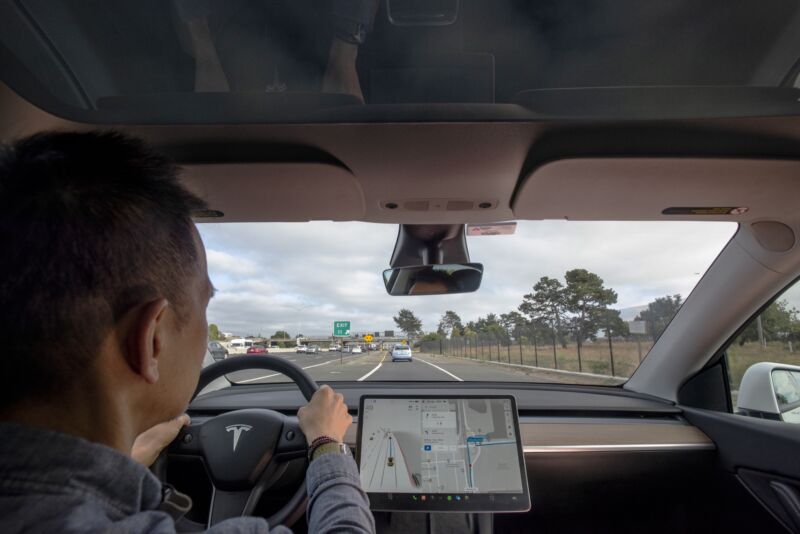U bent hier
Van dingen die voorbijkomen
Home Assistant’s new foundation focused on “privacy, choice, and sustainability”

Enlarge (credit: Open Home Foundation)
Home Assistant, until recently, has been a wide-ranging and hard-to-define project.
The open smart home platform is an open source OS you can run anywhere that aims to connect all your devices together. But it's also bespoke Raspberry Pi hardware, in Yellow and Green. It's entirely free, but it also receives funding through a private cloud services company, Nabu Casa. It contains tiny board project ESPHome and other inter-connected bits. It has wide-ranging voice assistant ambitions, but it doesn't want to be Alexa or Google Assistant. Home Assistant is a lot.
After an announcement this weekend, however, Home Assistant's shape is a bit easier to draw out. All of the project's ambitions now fall under the Open Home Foundation, a non-profit organization that now contains Home Assistant and more than 240 related bits. Its mission statement is refreshing, and refreshingly honest about the state of modern open source projects.
Apple reportedly plans M4 Mac mini for late 2024 or early 2025, skipping the M3

Enlarge / The M2 Pro Mac mini. (credit: Andrew Cunningham)
Bloomberg's Mark Gurman thinks that Apple's M4 chips for Macs are coming sooner rather than later—possibly as early as "late this year," per a report from earlier this month. Now Gurman says Apple could completely skip the M3 generation for some Macs, most notably the Mac mini.
To be clear, Gurman doesn't have specific insider information confirming that Apple is planning to skip the M3 mini. But based on Apple's alleged late-2024-into-early-2025 timeline for the M4 mini, he believes that it's "probably safe to say" that there's not enough space on the calendar for an M3 mini to be released between now and then.
This wouldn't be the first time an Apple Silicon Mac had skipped a chip generation—the 24-inch iMac was never updated with the M2, instead jumping directly from the M1 to the M3. The Mac Pro also skipped the M1 series, leapfrogging from Intel chips to the M2.
After 48 years, Zilog is killing the classic standalone Z80 microprocessor chip

Enlarge / A cropped portion of a ca. 1980 ad for the Microsoft Z80 SoftCard, which allowed Apple II users to run the CP/M operating system. (credit: Microsoft)
Last week, chip manufacturer Zilog announced that after 48 years on the market, its line of standalone DIP (dual inline package) Z80 CPUs is coming to an end, ceasing sales on June 14, 2024. The 8-bit architecture debuted in 1976 and powered a small-business-PC revolution in conjunction with CP/M, also serving as the heart of the Nintendo Game Boy, Sinclair ZX Spectrum, the Radio Shack TRS-80, the Pac-Man arcade game, and the TI-83 graphing calculator.
In a letter to customers dated April 15, 2024, Zilog wrote, "Please be advised that our Wafer Foundry Manufacturer will be discontinuing support for the Z80 product and other product lines. Refer to the attached list of the Z84C00 Z80 products affected."
Designers typically use the Z84C00 chips because of familiarity with the Z80 architecture or to allow legacy system upgrades without needing significant system redesigns. And while many other embedded chip architectures have superseded these Z80 chips in speed, processing power, and capability, they remained go-to solutions for decades in products that didn't need any extra horsepower.
Why a GameCube/Wii emulator may not be possible on the iOS App Store

Enlarge / Don't expect to see this on the iOS App Store any time soon. (credit: OatmealDome)
Last week's release of the Delta emulation suite finally gave iOS users easy, no-sideloading-required access to classic Nintendo game emulation up through the Nintendo 64 era. When it comes to emulating Nintendo's subsequent home consoles on iOS, though, some technical restrictions imposed by Apple are making it difficult to get a functional emulator on the App Store.
In a recent blog post, DolphiniOS developer (and longtime Switch hacker) OatmealDome explains how a Dolphin code fork—which ports the popular GameCube and Wii emulator to Apple's smartphone OS—uses just-in-time (JIT) compilation to translate the PowerPC instructions from those retro consoles into ARM-compatible iOS code. But Apple's App Store regulations against apps that "install executable code" (Section 3.3.1B) generally prevent JIT recompilation on iOS, with very limited exceptions such as web browsers. That restriction may have some valid security reasoning behind it, but it can also get in the way for developers of tools like third-party browser engines (except recently in the EU).
While MacOS developers can make use of an explicit entitlement to allow JIT recompilation in an app, that exception doesn't apply to iOS developers. And while alternative App Stores and sideloaded apps (including DolphiniOS) have discovered various ways to enable JIT compilation on both jailbroken and stock iOS devices, these workarounds can get quite arcane and occasionally break with new iOS releases.
Tesla cuts Full Self Driving cost by 1/3 ahead of earnings call

Enlarge / Tesla's "Full Self Driving" system just got a third cheaper. (credit: Edie Leong for The Washington Post via Getty Images)
Tesla has dropped the price of its controversial "Full Self Driving" partially automated driver assist. Last week, getting access to FSD would cost you $12,000—today, it's a third cheaper at $8,000. Alternatively, customers can subscribe to the feature for $99 a month.
Tesla has bet heavily on FSD for the future of the company. It's one of two partially automated driving systems offered by Tesla—Autopilot is the older and less-capable system. FSD includes features such as auto lane changes, auto parking, the ability to summon the car from its parking space, and lane keeping (Autosteer in Tesla-speak) on surface streets.
Tesla claims that "[y]our car will be able to drive itself almost anywhere with minimal driver intervention and will continuously improve," but then also notes that "[t]he currently enabled features require active driver supervision and do not make the vehicle autonomous."
Refereeing frequency, redux
The official Deadpool and Wolverine is finally here, and yes, it’s awesome
Ryan Reynolds and Hugh Jackman join forces in Deadpool and Wolverine.
We were already looking forward to the summer release of Deadpool and Wolverine, which will bring together Ryan Reynolds' R-rated antihero with Hugh Jackman's iconic X-Man. We're even more eager to see the film after Marvel dropped the official trailer, which is chock-full of off-color witticisms, meta-references, slo-mo action, and a generous sprinkling of F-bombs. (But no cocaine! Wade promised Feige! "They know all the slang terms. They have a list.")
"You’re talking about two massive movie stars in their most iconic roles,” Director Shawn Levy (Free Guy) told Screen Rant earlier this month. “It also gave me an opportunity. It’s the third Deadpool movie, but it’s not Deadpool 3. It’s a different thing that’s very much Deadpool and Wolverine. And it’s not trying to copycat anything from the first two movies. They were awesome, but this is a two-hander character adventure.”
(Spoilers for Deadpool 2 below.)
TikTok ready to “move to the courts” to prevent ban in US

Enlarge (credit: Sheldon Coope | SOPA Images | LightRocket | Getty Images)
TikTok is gearing up for a long legal battle to fight legislation in the US that threatens to ban the app in its largest market if its Chinese owner, ByteDance, refuses to sell the viral video platform.
The US House of Representatives on Saturday passed a package of national security bills that included legislation that would result in TikTok being banned in the country if Chinese parent company ByteDance does not divest the app.
Michael Beckerman, TikTok’s public policy head in the US, told staff in response that if the bill became law, the company would “move to the courts for a legal challenge.”
The Columbia University disaster
Meet QDEL, the backlight-less display tech that could replace OLED in premium TVs

What comes after OLED?
With OLED-equipped TVs, monitors, and other gadgets slowly becoming more readily available at lower prices, attention is turning to what the next landmark consumer display tech will be.
Micro LED often features in such discussions, but the tech is not expected to start hitting consumer devices until the 2030s. Display makers are also playing with other futuristic ideas, like transparent and foldable screens. But when it comes to technology that could seriously address top user concerns—like image quality, price, and longevity—quantum dots seem the most pertinent at the moment.
Parmenidean oneness vs. common sense and human life
Humans Started Enjoying Cannabis in China Circa 2800 BC
Judging by how certain American cities smell these days, you’d think cannabis was invented last week. But that spike in enthusiasm, as well as in public indulgence, comes as only a recent chapter in that substance’s very long history. In fact, says the presenter of the PBS Eons video above, humanity began cultivating it “in what’s now China around 12,000 years ago. This makes cannabis one of the single oldest known plants we domesticate,” even earlier than “staples like wheat, corn, and potatoes.” By that time scale, it wasn’t so long ago — four millennia or so — that the lineages used for hemp and for drugs genetically separated from each other.
The oldest evidence of cannabis smoking as we know it, also explored in the Science magazine video below, dates back 2,500 years. “The first known smokers were possibly Zoroastrian mourners along the ancient Silk Road who burned pot during funeral rituals,” a proposition supported by the analysis of the remains of ancient braziers found at the Jirzankal cemetery, at the foot of the Pamir mountains in western China. “Tests revealed chemical compounds from cannabis, including the non-psychoactive cannabidiol, also known as CBD” — itself reinvented in our time as a thoroughly modern product — and traces of a THC byproduct called cannabinol “more intense than in other ancient samples.”
What made the Jirzankal cemetery’s stash pack such a punch? “The region’s high altitude could have stressed the cannabis, creating plants naturally high in THC,” writes Science’s Andrew Lawler. “But humans may also have intervened to breed a more wicked weed.” As cannabis-users of the sixties and seventies who return to the fold today find out, the weed has grown wicked indeed over the past few decades. But even millennia ago and half a world away, civilizations that had incorporated it for ritualistic use — or as a medical treatment — may already have been agriculturally guiding it toward greater potency. Your neighborhood dispensary may not be the most sublime place on Earth, but at least, when next you pay it a visit, you’ll have a sound historical reason to cast your mind to the Central Asian steppe.
Related content:
The Drugs Used by the Ancient Greeks and Romans
Pipes with Cannabis Traces Found in Shakespeare’s Garden, Suggesting the Bard Enjoyed a “Noted Weed”
Reefer Madness, 1936’s Most Unintentionally Hilarious “Anti-Drug” Exploitation Film, Free Online
Carl Sagan on the Virtues of Marijuana (1969)
Watch High Maintenance: A Critically-Acclaimed Web Series About Life & Cannabis
The New Normal: Spike Jonze Creates a Very Short Film About America’s Complex History with Cannabis
Based in Seoul, Colin Marshall writes and broadcasts on cities, language, and culture. His projects include the Substack newsletter Books on Cities, the book The Stateless City: a Walk through 21st-Century Los Angeles and the video series The City in Cinema. Follow him on Twitter at @colinmarshall or on Facebook.
“Sociale media mogen mensen niet dwingen zich te laten volgen”
Socialemediaplatforms zoals Facebook en Instagram mogen hun gebruikers niet dwingen zich online te laten volgen in ruil voor toegang. Dat las ik bij Nu.nl. Hierachter zit een advies van de verzamelde Europese AVG-toezichthouders over „toestemmings- of beloningsmodellen” (Consent or Pay klinkt nét iets lekkerder), dat vrij hard oordeelt dat toestemming eigenlijk nooit rechtsgeldig kan zijn als het alternatief is de knip te trekken.
Enige tijd geleden oordeelde het Hof van Justitie inzake Meta dat het mogelijk moet zijn om toestemming voor tracking in te tracken, sorry trekken, zonder dat je geheel uit de dienst werd gegooid. Er moet een alternatief komen, desnoods tegen een gepaste vergoeding, waar geen tracking in zit:
Thus, those users must be free to refuse individually, in the context of the contractual process, to give their consent to particular data processing operations not necessary for the performance of the contract, without being obliged to refrain entirely from using the service offered by the online social network operator, which means that those users are to be offered, if necessary for an appropriate fee, an equivalent alternative not accompanied by such data processing operations.
Dit vatte men in Californië op als “zet een betaalde versie er naast en de trackingversie is legaal”, vandaar dat je sinds november 9 euro kunt betalen voor een reclamevrije versie. Zoals ik toen schreef: Het roept de fundamentele vraag op: hoe moet het dan wel? Als ze alleen de betaalde dienst hadden laten bestaan, was er denk ik weinig juridisch tegenin te brengen. Een netwerkdienst voor 10 euro per maand en zonder tracking, wat precies is daar mis mee. Maar het komt nu agressief over omdat we al heel lang die gratis versie hadden, en dus ons op kosten gejaagd voelen om die tracking te kunnen vermijden. De EDPB gaat terug naar die uitspraak van het Hof en zit zwaar op het “equivalent alternative”. Het is té makkelijk om naar dat bedrag te grijpen en te roepen dat het equivalent is. Een gratis variant met ongepersonaliseerde reclame had ook prima gekund, bijvoorbeeld. Want persoonsgegevens worden nu eigenlijk op één lijn met geld gesteld, en dat is zeer zeker niet de bedoeling.Het advies (dat dan wel zo heet maar zo dicht bij een bindend document komt als kan) staat voor meer dan de helft van de 42 pagina’s stil bij wat consent is en welke factoren daar aan kleven. Met name het “in vrijheid geven” in z’n eentje is een kwart van het document. Ik ben daar op zich wel blij mee, want er is nauwelijks écht gekeken naar die factoren. Neem nou het “detriment” verhaal: weigeren of intrekken mag geen nadeel opleveren, maar wat is dat dan? Als ik terugga in waar die term “detriment” of “nadelig gevolg” vandaan kom, dan kom ik bijvoorbeeld bij WP 187 van wat nu de EPDB is. Hieruit haal ik dat iets nadelig is als het zeg maar bestraffend is, je afschrikt die optie te kiezen. Dit halen ze uit eerdere papers over consent bij medische zaken (bij weigering consent geen behandeling, WP 131) en bij het werk (WP 48, bij weigering geen promotie/nieuwe baan). Helaas komt er geen fundamenteel criterium, maar wordt “als je elke dag op Facebook moet, dan is dat een vorm van nadeel” als waarheid geponeerd: Data subjects may suffer detriment if it becomes impossible for them to use a service that is part of their daily lives and has a prominent role. Let ook op de “may”, die met z’n vriendje “might” regelmatig terugkomt in dit stuk van de analyse. Alles kan – koffie kan, thee kan – maar is dit een theoretische zijsprong of gaat dit over 90% van de gevallen?
Afijn, de kern is dus dat grote sociale netwerken een sterke macht hebben en daarvan buitengesloten worden is op hetzelfde niveau als je baan kwijt raken. Ik snap wat men wil zeggen maar ik had denk ik een diepere analyse verwacht die dit rechtvaardigt dan “het is gewoon heel erg als ze je er niet op laten”.
De volgende stap zal zijn dat de toezichthouders aan Meta gaan vragen hoe deze denkt dat toestemming rechtsgeldig is verkregen in het licht van deze opinie. Op basis van dat antwoord kan men dan de verwerking door Facebook verbieden of een bindende aanwijzing geven dat er ook een gratis trackingvrije versie moet komen.
Arnoud
Het bericht “Sociale media mogen mensen niet dwingen zich te laten volgen” verscheen eerst op Ius Mentis.
Woorden in de Kamer (2020-2023) (5)
Explore a digitized collection of doomed Everest climber’s letters home

Enlarge / The final letter from George Mallory from Camp I, Mount Everest, to his wife Ruth Mallory, May 27, 1924. (credit: The Master and Fellows of Magdalene College, Cambridge)
In June 1924, a British mountaineer named George Leigh Mallory and a young engineering student named Andrew "Sandy" Irvine set off for the summit of Mount Everest and disappeared—just two casualties of a peak that has claimed over 300 lives to date. Mallory was an alumnus of Magdalene College at the University of Cambridge, which maintains a collection of his personal correspondence, much of it between Mallory and his wife, Ruth. The college has now digitized the entire collection for public access. The letters can be accessed and downloaded here.
“It has been a real pleasure to work with these letters," said Magdalene College archivist Katy Green. "Whether it’s George’s wife Ruth writing about how she was posting him plum cakes and a grapefruit to the trenches (he said the grapefruit wasn’t ripe enough), or whether it’s his poignant last letter where he says the chances of scaling Everest are '50 to 1 against us,' they offer a fascinating insight into the life of this famous Magdalene alumnus.”
As previously reported, Mallory is the man credited with uttering the famous line "because it's there" in response to a question about why he would risk his life repeatedly to summit Everest. An avid mountaineer, Mallory had already been to the mountain twice before the 1924 expedition: once in 1921 as part of a reconnaissance expedition to produce the first accurate maps of the region and again in 1922—his first serious attempt to summit, although he was forced to turn back on all three attempts. A sudden avalanche killed seven Sherpas on his third try, sparking accusations of poor judgement on Mallory's part.
Secrets of the Octopus takes us inside the world of these “aliens on Earth”

Enlarge / A Day octopus (Octopus cyanea) named Scarlet parachutes her web over a coral head while Dr. Alex Schnell observes. (credit: National Geographic/Disney/Craig Parry)
With Earth Day fast approaching once again, it's time for another new documentary from National Geographic and Disney+: Secrets of the Octopus. It's the third in what has become a series, starting with the remarkable 2021 documentary Secrets of the Whales (narrated by Sigourney Weaver) and 2023's Secrets of the Elephants (Natalie Portman as narrator). James Cameron served as producer on all three.
Secrets of the Octopus is narrated by Paul Rudd. Per the official synopsis:
Octopuses are like aliens on Earth: three hearts, blue blood and the ability to squeeze through a space the size of their eyeballs. But there is so much more to these weird and wonderful animals. Intelligent enough to use tools or transform their bodies to mimic other animals and even communicate with different species, the secrets of the octopus are more extraordinary than we ever imagined.
Each of the three episodes focuses on a specific unique feature of these fascinating creatures: "Shapeshifters," "Masterminds," and "Social Networks." The animals were filmed in their natural habitats over 200 days and all that stunning footage is accompanied by thoughtful commentary by featured scientists. One of those scientists is Dr. Alex Schnell, a native Australian and self described storytelling who has worked at Macquarie University, the University of Cambridge, and the Marine Biological Laboratory, among other institutions. Her research focuses on the intelligence of marine animals, particularly cuttlefish and octopuses.
The fungi in our guts can make cases of Covid worse

Enlarge / Computer illustration of Candida fungi. (credit: Kateryna Kon | Science Photo Library | Getty)
Fungi are an indispensable part of your microbiome, keeping the body’s host of microorganisms healthy as part of a system of checks and balances. But when you’re hit by an infection, fungi can be thrown out of equilibrium with other organisms inside you, leading to a more severe infection and other symptoms of illness.
For this reason, the pandemic immediately set off alarms for Iliyan Iliev, an immunologist at Weill Cornell Medical School. “We were thinking, the first thing that’s going to happen is people will start getting fungal co-infections,” he says. With the microbiome unbalanced, fungi might start running riot inside Covidpatients, Iliev reasoned. His fears were soon realized.
In research published in Nature Immunology, he and his team discovered that in patients with severe Covid, certain strains of gut fungi—knocked off-kilter by the virus—set off a prolonged immune response that could last long after the initial infection. This response potentially led to some of the respiratory symptoms experienced by these patients. These results, Iliev says, point to the critical role of the gut microbiome in the human immune response and could lead to better disease treatments down the line.








































































































![Reference manager - [Onderhoud aantekeningen]](https://labyrinth.rienkjonker.nl/sites/default/files/styles/medium/public/Reference%20manager%20v3%20-%20%5BOnderhoud%20aantekeningen%5D%2014-2-2010%20102617_0.jpg?itok=OJkkWhxY)
![Reference manager - [Onderhoud aantekeningen]](https://labyrinth.rienkjonker.nl/sites/default/files/styles/medium/public/Reference%20manager%20v3%20-%20%5BOnderhoud%20aantekeningen%5D%2014-2-2010%20102628.jpg?itok=CUvhRRr7)
![Reference manager - [Onderhoud bronnen] - Opnemen en onderhouden](https://labyrinth.rienkjonker.nl/sites/default/files/styles/medium/public/Reference%20manager%20v3%20-%20%5BOnderhoud%20bronnen%5D%2014-2-2010%20102418.jpg?itok=d7rnOhhK)
![Reference manager - [Onderhoud bronnen]](https://labyrinth.rienkjonker.nl/sites/default/files/styles/medium/public/Reference%20manager%20v3%20-%20%5BOnderhoud%20bronnen%5D%2014-2-2010%20102433.jpg?itok=CgS8R6cS)
![Reference manager - [Onderhoud bronnen]](https://labyrinth.rienkjonker.nl/sites/default/files/styles/medium/public/Reference%20manager%20v3%20-%20%5BOnderhoud%20bronnen%5D%2014-2-2010%20102445_0.jpg?itok=4oJ07yFZ)
![Reference manager - [Onderhoud bronnen]](https://labyrinth.rienkjonker.nl/sites/default/files/styles/medium/public/Reference%20manager%20v3%20-%20%5BOnderhoud%20bronnen%5D%2014-2-2010%20102500.jpg?itok=ExHJRjAO)
![Reference manager - [Onderhoud bronnen]](https://labyrinth.rienkjonker.nl/sites/default/files/styles/medium/public/Reference%20manager%20v3%20-%20%5BOnderhoud%20bronnen%5D%2014-2-2010%20102524.jpg?itok=IeHaYl_M)
![Reference manager - [Onderhoud bronnen]](https://labyrinth.rienkjonker.nl/sites/default/files/styles/medium/public/Reference%20manager%20v3%20-%20%5BOnderhoud%20bronnen%5D%2014-2-2010%20102534.jpg?itok=cdKP4u3I)
![Reference manager - [Onderhoud thema's en rubrieken]](https://labyrinth.rienkjonker.nl/sites/default/files/styles/medium/public/Reference%20manager%20v3%20-%20%5BOnderhoud%20themas%20en%20rubrieken%5D%2020-9-2009%20185626.jpg?itok=zM5uJ2Sf)













![Reference manager - [Raadplegen aantekeningen]](https://labyrinth.rienkjonker.nl/sites/default/files/styles/medium/public/Reference%20manager%20v3%20-%20%5BRaadplegen%20aantekeningen%5D%2020-9-2009%20185612.jpg?itok=RnX2qguF)
![Reference manager - [Relatie termen (thesaurus)]](https://labyrinth.rienkjonker.nl/sites/default/files/styles/medium/public/Reference%20manager%20v3%20-%20%5BRelatie%20termen%20%28thesaurus%29%5D%2014-2-2010%20102751.jpg?itok=SmxubGMD)
![Reference manager - [Thesaurus raadplegen]](https://labyrinth.rienkjonker.nl/sites/default/files/styles/medium/public/Reference%20manager%20v3%20-%20%5BThesaurus%20raadplegen%5D%2014-2-2010%20102732.jpg?itok=FWvNcckL)
![Reference manager - [Zoek thema en rubrieken]](https://labyrinth.rienkjonker.nl/sites/default/files/styles/medium/public/Reference%20manager%20v3%20-%20%5BZoek%20thema%20en%20rubrieken%5D%2020-9-2009%20185546.jpg?itok=6sUOZbvL)
![Reference manager - [Onderhoud rubrieken]](https://labyrinth.rienkjonker.nl/sites/default/files/styles/medium/public/Reference%20manager%20v3%2020-9-2009%20185634.jpg?itok=oZ8RFfVI)

![Reference manager - [Onderhoud aantekeningen]](https://labyrinth.rienkjonker.nl/sites/default/files/styles/medium/public/Reference%20manager%20v3%20-%20%5BOnderhoud%20aantekeningen%5D%2014-2-2010%20102603.jpg?itok=XMMJmuWz)


































































